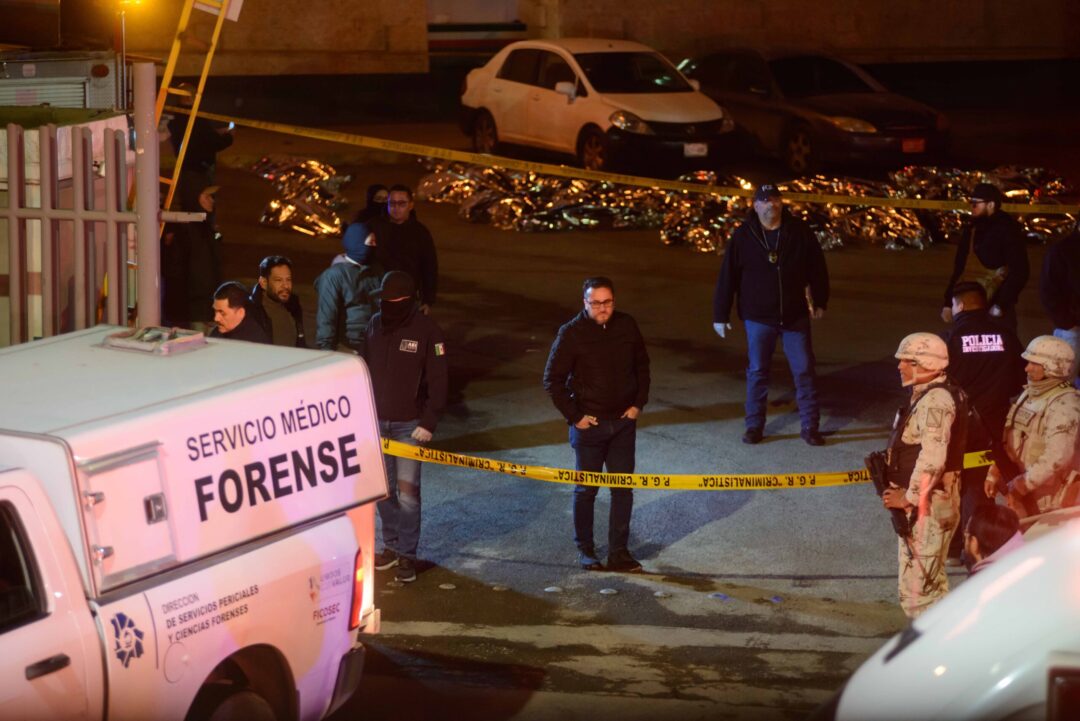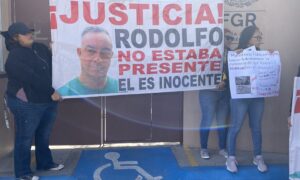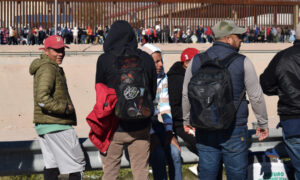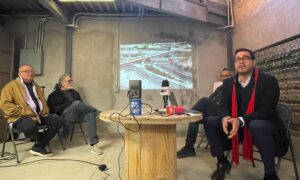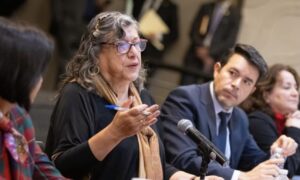By Blanca Carmona / La Verdad
Translation: El Paso Matters
For Kelly Joana Ospina González, life hasn’t been the same since March 27, 2023.
The day began with her arrest. Along with two female cousins, Ospina González was apprehended at the Juárez airport, accused of entering Mexico from Colombia without a permit. The trio were taken to the National Migration Institute (INM), a migrant detention center, where they were placed in a holding area. That night, Ospina González said she feared she was going to die when fire erupted a short distance from her holding cell. The blaze, which was a result of a number of safety failures and oversights, killed 40 men.
Ospina González said she panicked when black smoke began to spread toward the interior of the area where she and 14 other migrant women were held including her cousins, Carolina and Jenny. The trio arrived in Juárez with the intention of crossing into the United States.
“We began to see that the facilities were filling with a lot of smoke, we still didn’t know anything (about what was happening) … until I heard a girl who was taking care of us – a security guard – say, ‘This is catching fire,’” Ospina González said in a video interview from the United States.
She is one of the 15 women who survived the fire at the immigration detention center. Along with the deaths, 27 were left with lifelong injuries from the fire that was sparked by burning mattresses lit by migrants to protest their living conditions.
“We started saying, ‘Get us out, help us,’ like that, ‘What is happening?’” said Ospina González, who along with her cousin, Jenny, decided to break their silence in hopes of being recognized as victims of the conditions endured by migrants under the protection of authorities.
Both women consider themselves reborn after they said they came so close to death. That night, as the smoke billowed, they covered their faces with wet towels. A few seconds before they started walking toward a bathroom, a security guard from the company CAMSA turned back and opened the padlock of their cell.
The women were taken out minutes after the fire started. Video from outside the building later shows them sitting on the front steps, where they were kept under surveillance all night. While there, the women watched as dozens of bodies were placed in front of them in the parking lot of the INM building.
“We took too long to talk about it because we were full of panic, very afraid,” Ospina González said.
Article 4 of Mexico’s general law of victims defines victims as individuals who have suffered any economic, physical, mental, emotional damage or impairment, or in general any endangerment or injury to their legal assets or rights as a consequence of the commission of a crime or violations of their human rights recognized in the constitution and in the international treaties to which Mexico is a party.
‘They could have done something’
Video captured by the security cameras of the INM building and released as part of an investigation by La Verdad, Lighthouse Reports and El Paso Matters, show that center officials and the guards of the CAMSA company left the area that was burning, leaving male migrants locked inside. At no time did they try to open the cell door.
The investigation also revealed a video in which the voice of a woman can be heard saying: “No, we are not going to them (inaudible) … we are not going to open it for them.”
The women, however, were removed from the cells where they were held.
“Everyone started screaming and everything, hitting the fence and screaming, and she (the security guard) came back and opened it for us,” remembers Jenny, who asked that her last name be withheld.
More than a year after the fire, she said it is difficult to talk about it. Now, the women have started raising their voices, but have asked not to reveal their faces.
“It makes me sad. It makes me angry to know they could have done something for the boys who were there and that we saw that in front of us,” said Jenny in a video interview from the United States where she crossed with her cousins two days after the tragedy. “No one did anything, and they were more concerned about taking care of us.”
The night of March 27, the women were instructed to remain seated outside the INM building. From there they heard the staff discussing the location of the keys to the men’s holding area. They also listened to other women agonize over male relatives who were locked in the facility.
“One of the girls was asking for help for her father,” Ospina González said. “A Venezuelan who was with us asked for help for her brother who was there and they didn’t want to open the door. They said they couldn’t find the keys. There was a police officer, I remember, a tall, gray-haired man, who said, ‘To hell with it, they asked for it,’ as if they weren’t human lives.”
The women claim that they did not see INM personnel call the emergency services to report the fire.
From the steps where they were kept under surveillance, they observed the eventual arrival of a fire engine. However, they said that when they were leaving their cell, they no longer heard screams from the area where the men were held. Hours earlier, the women heard the men asking for water, food and arguing with the guards and immigration officers.
“Many people began to arrive later, but it was too late. We began to see how they took out the bodies in front of us, how they threw them like animals,” Kelly said.
When the three cousins, born in Colombia, arrived at the immigration station, they were ordered to sit in front of the men’s room and were impressed to see the number of people who were locked in a space that they described as very small.
“There were a lot of people, a lot of men in that place that was so small,” Ospina González said.
Throughout the night of the fire and until dawn, the women remained outside the damaged building.
“We were very scared, we were very cold,” Ospina González said. “There was one of those security guards or police officers, I don’t even know what he was, who was a bald guy, who insulted us. He personally insulted me. He asked me why we had gone to Mexico, that they killed many women every day, that, if we wanted to be next, that we should return to our country.”
The next morning, the 15 women were taken to the Leona Vicario shelter, a federal facility, where they were offered a humanitarian visa to stay up to 180 days in Mexico. The three Colombian women, however, opted to move on out of fear.
On March 29, they crossed the Rio Grande, surrendered to U.S. Border Patrol agents and identified themselves with their Colombian passports, which were returned to them a few minutes before the fire broke out in the INM cell.
Nearly 16 months have passed since the tragedy, and the women claim they have each heard only once from an official of the Attorney General’s Office (FGR), the agency leading the investigation. When they responded, the official indicated he no longer worked for the investigative body and did not provide any additional information. Because of this lack of communication, the women perceive that they continue to be invisible to the authorities and carry the sentiment that they are not considered victims in the aftermath of the tragedy.
“We were born again because we thought we could have also been in that place (in the men’s cell),” Jenny said. “If you make a very drastic change in life and sometimes you start thinking and try to be a better person, that makes you change a lot and look at life differently.”
Ospina González added: “We do not have the same peace of mind. First, because we feel that a small part of us was left there. Seeing so many people die, seeing how they were taken out, seeing the suffering of all the women who were with us who had their relatives there, their parents, their brothers, their husbands, their friends, seeing the uncertainty, seeing how we were treated like animals … seeing that I was there, a hair’s breadth away from dying.”


